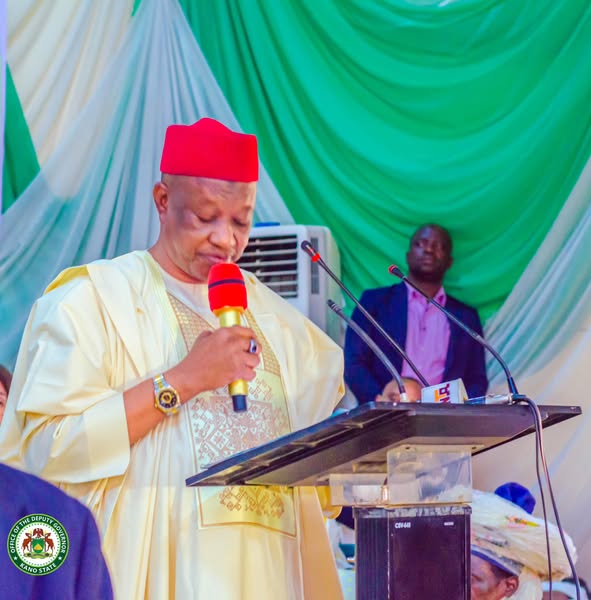By Abdullahi Yusuf
Kano State Deputy Governor, Comrade Aminu Abdussalam Gwarzo, on Tuesday launched an Irrigation Suitability Mapping Tool Research Project at Aliko Dangote University of Science and Technology (ADUSTECH), Wudil.
While launching the project, Gwarzo reaffirmed the commitment of the State Government to education and agriculture development.
He said the state government had accorded top priority to education, allocating 31 percent of its 2025 budget to the sector, which according to him,was the highest in the federation.
He also noted that the government had declared a State of Emergency in education to ensure a focused and comprehensive approach to educational development.
“Aliko Dangote University of Science and Technology is one of the beneficiaries of our education agenda.
“We have approved a development plan for the university, earmarked significant funds to settle outstanding liabilities, and prioritised the completion of abandoned projects,” the deputy governor said
He traced the origin of the university to the administration of former Governor Rabiu Musa Kwankwaso, “which saw the establishment of two state-owned universities to equip Kano’s youth with 21st-century skills in science and technology.”
He commended the university’s management headed by the Vice-Chancellor, Prof. Musa Tukur Yakasai, noting its success in attracting donor agencies for research collaborations in agriculture, ICT and other technological fields.
He welcomed the partnership between ADUSTECH and the International Food Policy Research Institute (IFPRI), supported by the Bill and Melinda Gates Foundation, particularly on the Irrigation Suitability Mapping Tool Project.
Gwarzo recalled an earlier collaboration on Climate Change, Gender, and Nutrition Integration (GCAN) and announced that Kano State had now signed its Climate Change Policy into law, fully integrating gender and nutrition considerations.
Acknowledging agriculture as Kano’s economic backbone, the deputy governor overnor noted the state’s leadership in irrigation farming, boosting the largest irrigation fields, dams and schemes in the country.
He described the Irrigation Suitability Mapping Tool as a critical innovation that would help the government, financial institutions and input suppliers to make informed investment decisions.
“While this tool does not replace traditional agricultural extension services, it will significantly enhance farmers’ access to valuable business information and decision-making support,” he said.
He also expressed hope that the project would benefit the government, financial institutions, input suppliers, and irrigation farmers in Kano State and beyond.
Gwarzo assured the audience of the government’s commitment to the project’s success, urging donor agencies to support future phases for the benefit of Kano’s farmers.
He expressed gratitude to the Bill and Melinda Gates Foundation, IFPRI, and ADUSTECH for their support in strengthening irrigation farming in the state.
In his opening remarks, ADUSTECH Vice-Chancellor, Prof. Musa Tukur Yakasai, welcomed guests and emphasized the university’s dedication to scientific research and technological advancement.
Yakasai recalled the institution’s evolution from its founding in 2001 as Kano University of Science and Technology (KUST) to its renaming in honour of business mogul,Alhaji Aliko Dangote, reflecting its strengthened commitment to innovation and development.
He also highlighted the university’s accreditation of 41 out of 45 academic programmes, its 57 postgraduate research programmes and its extensive network of national and international collaborations.
“The Irrigation Suitability Mapping Tool Research Project is a testament to our mission of solving real-world challenges through innovative research.
“This initiative will directly benefit communities by enhancing agricultural productivity and sustainability,” the vice chancellor said.
He thanked the researchers, partners and other stakeholders involved in the project, emphasizing their collective role in advancing the university’s vision.


